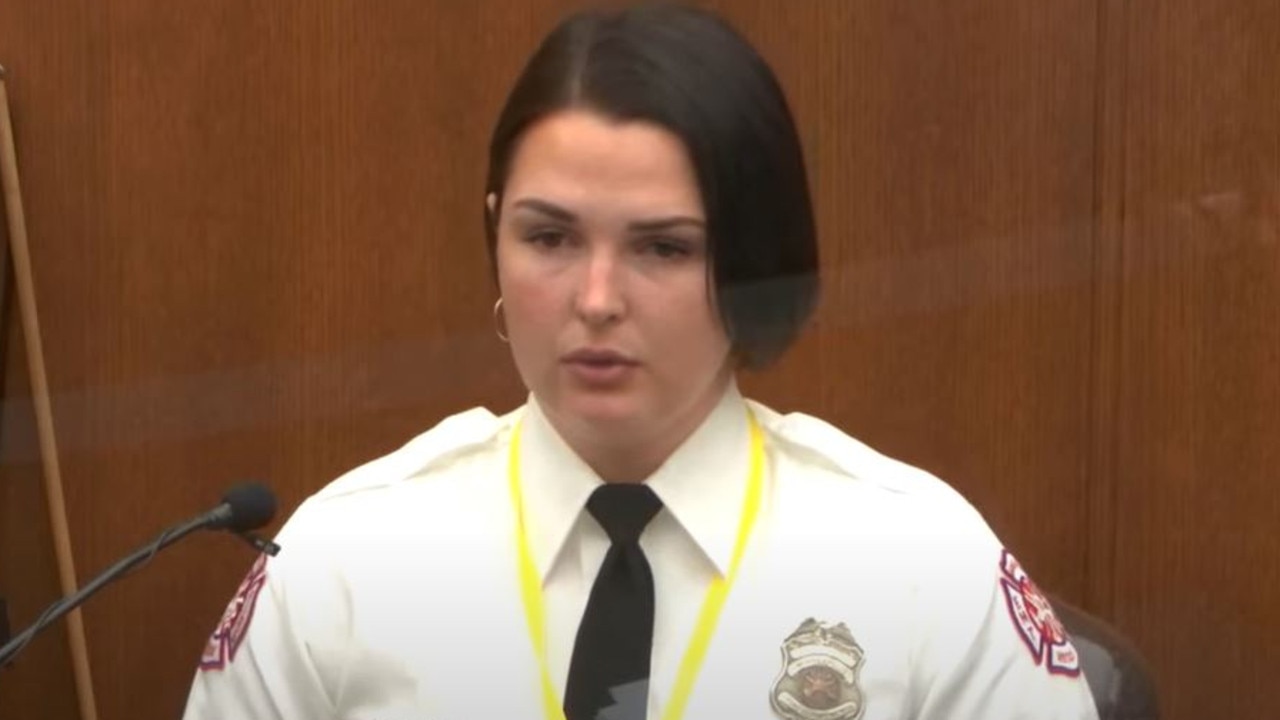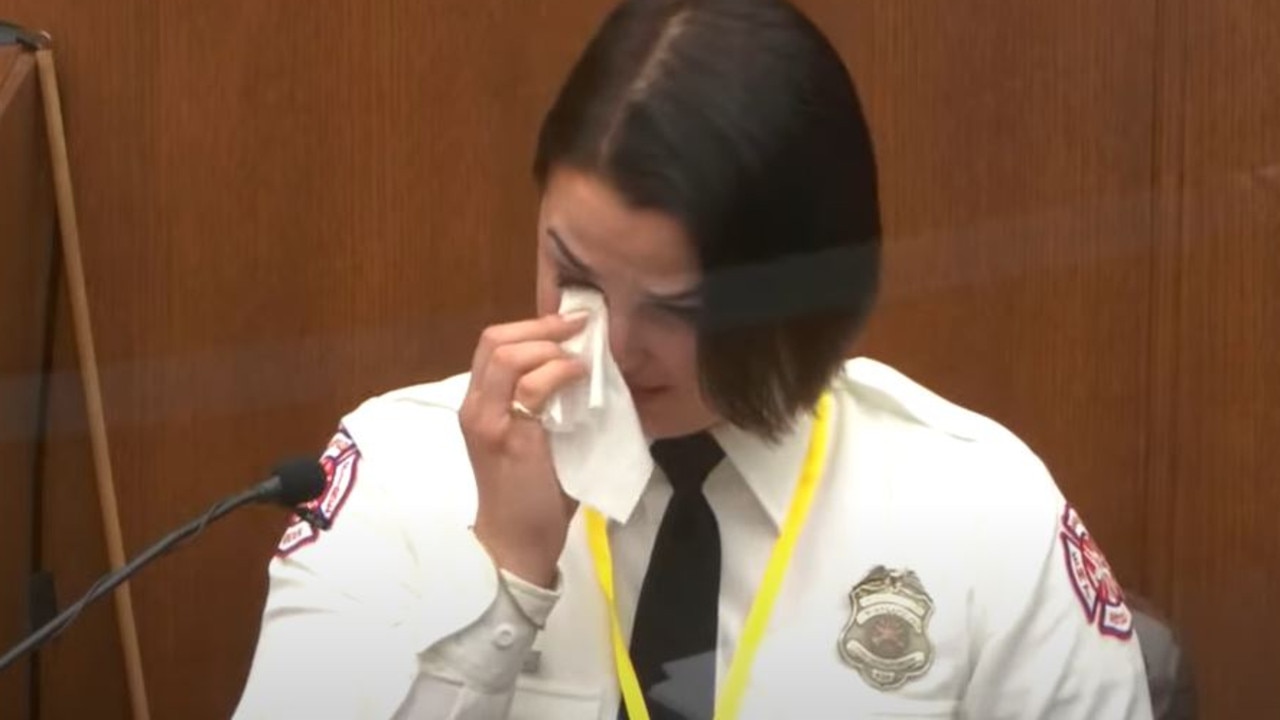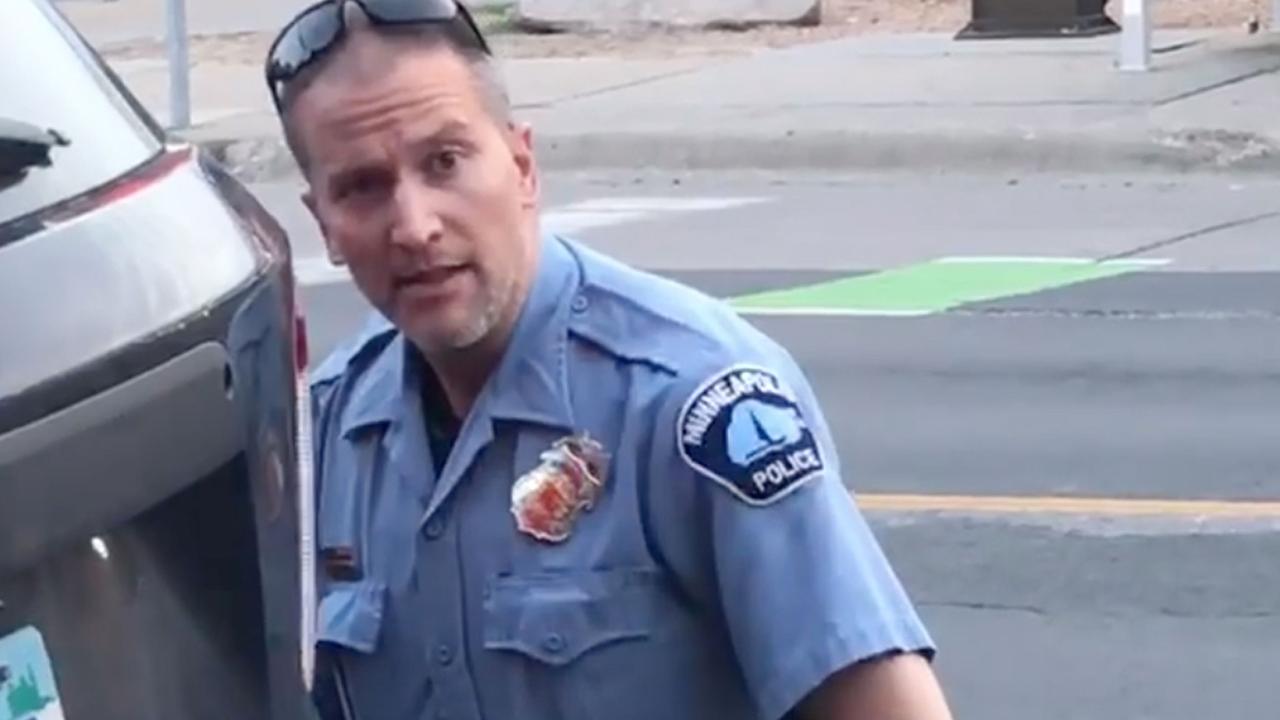George Floyd murder trial: Judge castigates witness for arguing with defence lawyers
The trial of George Floyd’s alleged killer took a dramatic turn late in the day as the judge halted proceedings to lecture a witness.
The trial of former police officer Derek Chauvin, accused of murdering George Floyd, took a dramatic turn late on Tuesday as the judge halted proceedings to castigate a key witness.
Genevieve Hansen, a Minneapolis firefighter who says police officers prevented her from giving Mr Floyd desperately needed medical attention as Chauvin knelt on his neck, was being cross examined by the defence team.
Judge Peter Cahill felt she was arguing with defence lawyer Eric Nelson instead of answering his questions directly.
“Do not argue with counsel, and specifically do not argue with the court. They have the right to ask questions. Your job is to answer them,” the judge said.
“I was finishing my answer,” she protested.
“I will determine when your answer is done,” Judge Cahill shot back.
He pointed out that prosecutors could ask Ms Hansen follow-up questions on redirect if they felt the defence had left out important details.
“Are we clear?” he asked.
She said yes. He then dismissed her from the stand for the day, telling her to return on Wednesday morning to complete her testimony.
RELATED: Opening arguments in George Floyd murder trial
Ms Hansen arrived at the scene of the incident as a bystander, but as she had emergency medical training, tried to help Mr Floyd. She said police officers would not even let her examine him.
By the time Judge Cahill intervened this afternoon, she had already engaged in several tense exchanges with Mr Nelson.
At one point he asked about her demeanour at the scene, and specifically whether she had got “angry” with police and called one of the officers “a b**ch”.
“I got quite angry after Mr Floyd was loaded into the ambulance, and there was no point in trying to reason with them anymore because they had just killed somebody,” she replied.
At another point, as he quizzed her on the demeanour of other bystanders, she lost patience.
“I don’t know if you’ve seen anybody be killed, but it’s upsetting,” Ms Hansen said.
Mr Nelson suggested the stress of the situation may have affected her memory.
“A stressful situation can affect memory, right?” he asked.
“Yes. That’s why it’s great that we have it on video,” she responded.
He also asked whether it was “reasonable to assume” that police had already called for medical assistance when Ms Hansen arrived on the scene, the implication being that her help was not needed.
“Your question is unclear because you don’t know my job,” she told him.

Earlier, under direct examination from the prosecution, Ms Hansen laid out her version of events.
“There was a man being killed,” she said.
“I would have been able to provide medical attention to the best of my abilities. And this human was denied that right.”
The firefighter specifically blamed Officer Tou Thao for refusing to give her access to Mr Floyd.
“He said something along the lines of, ‘If you really are a Minneapolis firefighter, you would know better than to get invovled,’” she recounted.
“That wasn’t right. That was exactly what I should have done. There was no medical assistance on scene, and I got there and I could have given medical assistance. That’s exactly what I should have done.”
Asked what she would have done, given the chance, she said she would have checked Mr Floyd’s airway for obstructions and checked his pulse.
“When I didn’t find a pulse, if that was the case, I would have started compressions, and continued impressions at a rate of 100 a minute until help arrived,” Ms Hansen explained.
She said she told the officers that, if they weren’t going to allow her into the scene, they should check his pulse themselves and start compressions if necessary.
“That wasn’t done either,” she said.
Ms Hansen was left “frustrated” and “totally distressed”.
At this point she paused her testimony to wipe her eyes.
Continuing a few moments later, Ms Hansen said she tried several different approaches to appeal to the officers, from “calm and reasoning” to “assertive”.
“I pled and was desperate,” she said.
The prosecutor asked whether she used “foul language”. The answer was yes.
“I was desperate to help, and I wasn’t getting what I needed to do. I needed access,” said Ms Hansen.

Chauvin has been charged with second-degree murder, third-degree murder and manslaughter, and could face up to 15 years in jail.
Earlier on day two of the trial, the jury heard from Donald Williams, a mixed martial arts fighter and one of the bystanders who witnessed the incident.
“You could see that he was going through tremendous pain,” Mr Williams said.
“You could see he was trying to gasp for air.”
He said he tried to intervene to help Mr Floyd, but was prevented from doing so by Mr Thao.
When Mr Floyd was removed from the scene by an ambulance, Mr Williams called 911.
“Why did you do that?” the prosecution asked him.
“Because I believed I witnessed a murder,” he replied.
Prosecutors then presented audio of the 911 call. Mr Williams grew visibly emotional and wiped away a tear as the recording played.
Donald Williams II wipes a tear on the witness stand as the 911 call where he reported the killing of George Floyd is played during Derek Chauvin's trial.
— CBS News (@CBSNews) March 30, 2021
“He just pretty much killed this guy that wasn’t resisting arrest," he is heard saying. pic.twitter.com/ofW4gnrZng
“The officers are trying to definitely kill a citizen in front of a store,” Mr Williams told the 911 dispatcher.
“He just pretty much just killed this guy that wasn’t resisting arrest. He had his knee on the dude’s neck the whole time.
“He wasn’t resisting arrest or nothing. He was already in handcuffs. They pretty much – it’s stupid, dude. I don’t even know if he’s dead for sure, but he was not responsive when the ambulance came and got him.
“The officer that was just out here left, the one that actually just murdered him in front of everybody.
“That was bogus, what they just did to this man. He was unresponsive. He wasn’t resisting arrest or any of it.”
The dispatcher then sought to put Mr Williams through to a sergeant.
Towards the end of the call, Mr Williams could be heard speaking to an officer at the scene.
“Murderers, bro. Y’all are murderers, pal,” he said.
When the recording ended, the prosecution again asked him why he made the 911 call. He said he “didn’t know what else to do”, and felt like it was the right course of action.
During cross examination, the defence suggested Mr Williams had behaved in a threatening and disruptive way towards police, feeding into its opening argument that bystanders contributed to the incident by distracting the officers.
In footage of Chauvin pinning Mr Floyd to the ground, Mr Williams could be heard calling Chauvin a “bum” and telling the officer he would shoot himself “within the next two years”.
“You can’t paint me out to be angry,” Mr Williams told defence lawyer Eric Nelson.
Mr Nelson also stressed that Mr Williams had no medical experience with which to judge the officers’ treatment of Mr Floyd.
Today the jury also heard from Darnella Frazier, the teenager whose video footage of Chauvin kneeling on Mr Floyd went around the world.
RELATED: Shocking video from George Floyd incident

Ms Frazier, who was 17 at the time of the incident, came across the scene while walking past the Cup Foods store with her nine-year-old cousin. She directed her cousin to enter the store instead of staying outside with her.
Prosecutors asked Ms Frazier whether she did so because there was something she didn’t want her cousin to see.
“Yes. A man terrified, scared, begging for his life,” she replied.
“It wasn’t right. He was suffering. He was in pain.”
She proceeded to pull out her phone and record the officers’ actions.
The prosecution told Ms Frazier to tell the jury what she observed from that point onwards.
“I heard George Floyd saying, ‘I can’t breathe, please, get off of me. I can’t breathe.’ He cried for his mum. He was in pain,” she said.
“It seemed like he knew it was over for him. He was terrified. He was suffering. This was a cry for help, definitely.”
Ms Frazier grew particularly emotional when she was asked to explain how the event she witnessed had changed her life. Speaking through tears, she said she had stayed up at night apologising to Mr Floyd for not doing more to intervene.
Crying, the teen who took the video of George Floyd's fatal arrest said she's stayed up some nights apologizing to Floyd.
— CBS News (@CBSNews) March 30, 2021
"I stayed up apologizing and apologizing to George Floyd for not doing more and not physically interacting and not saving his life." pic.twitter.com/t0ppIfikHQ
“When I look at George Floyd I look at my dad. I look at my brother, I look at my cousins, my uncles. Because they are all black.
“I look at how that could have been one of them.
“It’s the nights I’ve stayed up apologising to George Floyd for not doing more, and not physically interacting, not saving his life.”
This morning, Judge Peter Cahill ruled that four witnesses – including Ms Frazier – could testify off camera because of their age.
Another of them, identified only as Alissa, also cried.
“I felt like there wasn’t anything I could do as a bystander. I felt like I was failing him,” she said.




